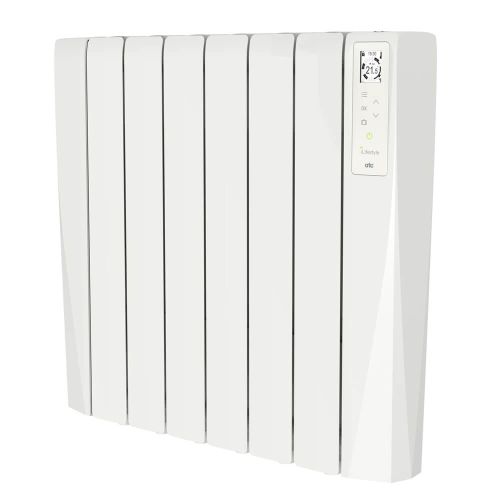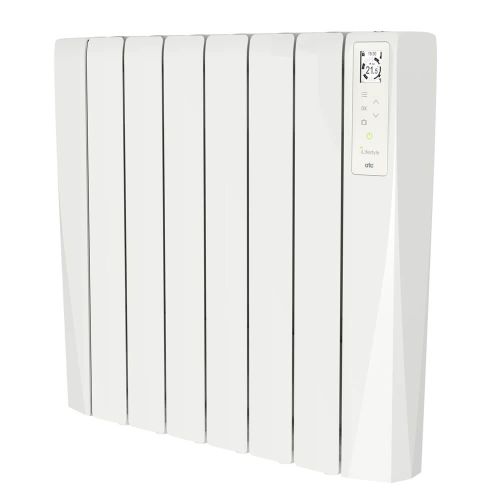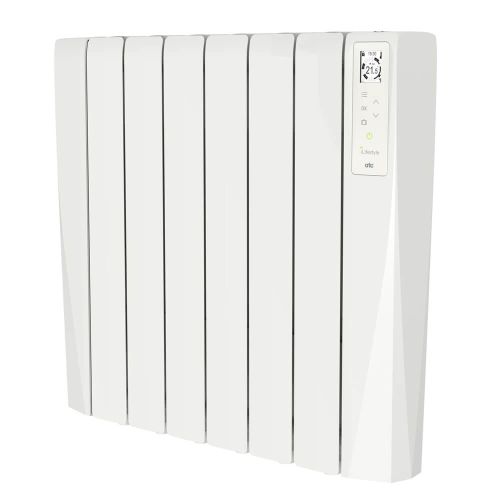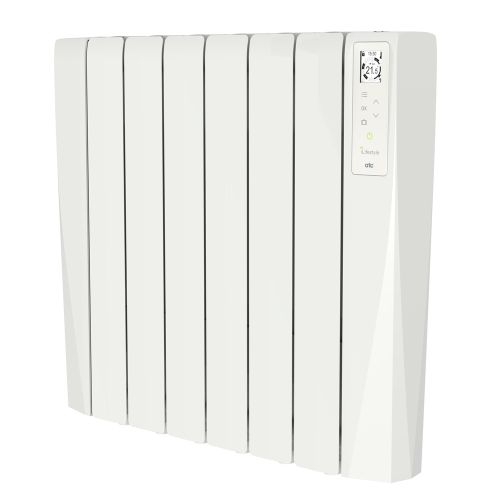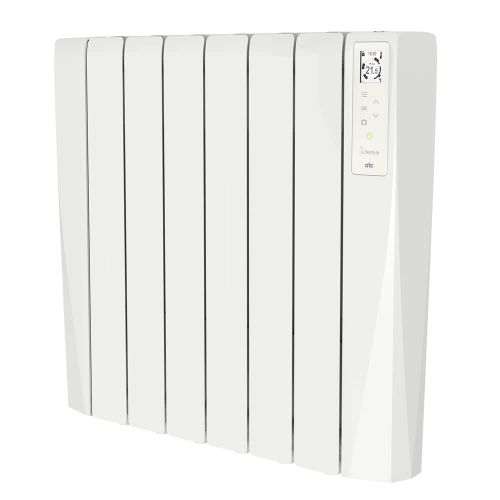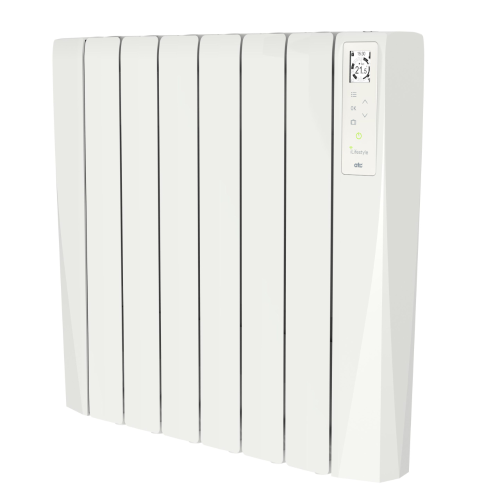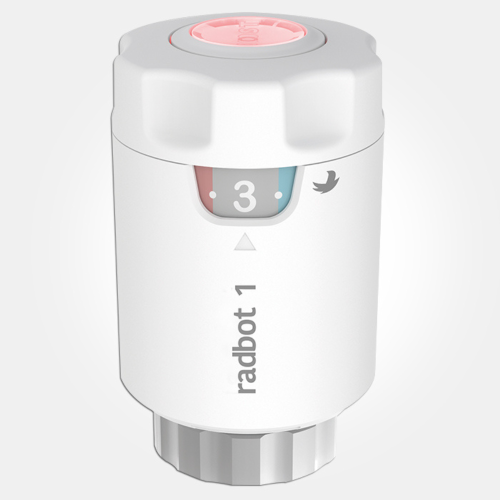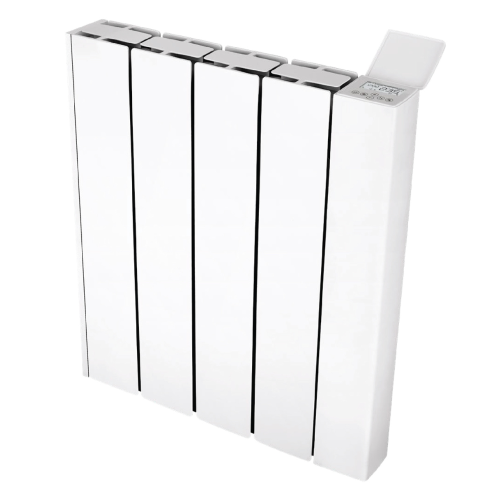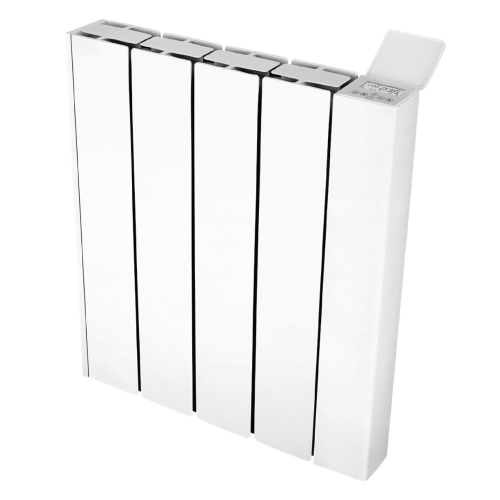Smart Heaters
Smart heaters are electronic devices that is used to heat a room and takes a step further by incorporating smart technology to make this process more efficient and advanced. The main difference from the usual device is how the WiFi heater devices available at Meteor can calibrate the temperature with the thermostat and regulate itself.
With a smart electric heating system, it is possible to keep that temperature stable in the degrees that the user has set, as well as the WiFi heater is programmed in more complex ways than the usual heater.
Compared to smart electric heating, traditional options are hardly as flexible or give as many options as their more advanced counterparts. You can run older heaters at various power levels and they also come with a basic timer, but that’s about it. A WiFi electric smart heater in comparison provides many more configuration and functionality options that are a great advantage to the user.
How Does a Smart Heater Work?
The smart electric heater connects to your boiler and your WiFi connection simultaneously and this allows you to have remote control over the heating – linking it to your smart home system. Other features vary by a thermostat but can include features such as multi-room control, hot water control, geofencing to track when the room is occupied or not, and safety modes that protect pipes when you are not present. With the use of a smartphone app and smart heaters, you can wirelessly schedule your heating. The primary advantage of smart heaters is that they make your heating lot more convenient and easy to operate. Simply pull out your phone and make the necessary adjustments by tapping the screen. Electric smart heaters with WiFi allow you to update your heating from anywhere in the world over the internet, while other items are Bluetooth compatible, allowing your phone to operate as a remote control. Look for smart heaters that have hands-free voice control with Google Home or Amazon Alexa for even greater ease.
More About Smart Heaters
A WiFi electric radiator or smart heaters is an advanced way to control heating from a smartphone for your domestic or commercial space.
This type of setup requires a thermostat with a multi-zone set-up that allows you to connect with a WiFi network. After the setup is complete, it will be possible to control the temperature of individual rooms wirelessly and remotely with your smart heaters.
Smart electric radiators also can collaborate with smart thermostats and automatically adjust the temperatures outside by collecting and tracking weather data. This feature integrated into smart heaters is called weather compensation and allows the user to stay warm when it’s cold and cool when it’s warm.
It is possible to control the smart heaters that you have installed through either an app on your smartphone, tablet, computer, or remort control. Setting up a multi-zone with a smart heaters will also allow you to choose whether to heat the whole house or specific individual rooms within a given area.
Smart Heaters Features
A WiFi electric radiator comes with various features that make it a technologically advanced heating system that fits in with the user’s needs and requirements much more efficiently than its traditional counterparts. Here are some useful features of smart heaters listed below.
Weather-Responsive
Smart heaters available at Meteor are capable of altering their performance depending on the temperature conditions outside. For example, if it is cold outside then the WiFi electric radiator will change the heating levels to keep the temperature in your space within your comfort zone.
The smart electric radiators that you can find at Meteor have weather compensating features integrated and are capable of checking the conditions outside and controlling your boiler to reach the right temperature without wasting energy to do so.
Hot Water Controls
Some smart heaters available at Meteor can allow you to control your hot water and central heating depending on the type of boiler you have. If you have a boiler system that heats the water immediately, then the smart heaters you get isn’t needed for this feature.
Through the use of a smart application, you can adjust, schedule, and turn on and off the hot water, just as you would be able to do with the heating through smart heaters. This will be possible to do both wirelessly or remotely.
App and PC Functionality
The smart heaters that you can find on Meteor can be controlled with their dedicated apps that will ensure that you get the most out of your smart electric heating system to enjoy a comfortable climate while simultaneously being energy-efficient and protecting the environment whilst saving on costs.
Multi-Room Control or Zonal Heating
This feature of smart electric radiators is ideal for large spaces where certain rooms are not used all the time and as often as others. The smart heaters available at Meteor will allow the user to set individual temperatures for different rooms – this allows you to turn off the heating in a room that you rarely use or turn up the heat more in another more frequently used room.
The way to implement this is by purchasing a smart thermostat for each zone area or smart radiator valves for control in each room.
Energy Reports
Smart heaters provide access to an energy report from your installed thermostats and this feature can give a detailed understanding of where the heating bill is from and how to reduce it.
Advantages of Smart Heaters
- Remote Control – Smart heaters are not tied to a timer’s control panel and can be set from a smartphone or by voice command. This allows the user to turn on the heating before you reach home or turn it off while you are outside the house. A feature like this integrated into smart heaters elevates the user experience, functionality, and comfort levels of any space.
- Easy to Use – Despite being an example of an advanced technological system, smart electric radiators are fairly simple to use and programming through an application is far more convenient than doing so from a control panel.
- Save Energy – Smart heaters could help you save energy and reduce your bills at the same time. WiFi electric radiator devices are capable of learning how fast your space cools and heats. Since they can also adjust for the weather, this fine-tuning allows your heating runs more efficiently. In addition, smart heaters can also track your energy use and make recommendations for saving.
- Works with Your Smart Home – Smart heaters are linked to WiFi networks and the smart electric heating system, therefore, becomes part of your smart home. You will be able to control your smart heaters through voice assistants such as those produced by Google and Amazon and be able to integrate it into routines.
- Works with Your Boiler– Similarly to traditional heating systems, smart heaters work with various heating systems and any energy supplier. In most cases, you will be able to swap your old system for a more efficient and advanced smart electric heating system range available from Meteor.
Features of WiFi Electric Radiator Applications
Smart heaters often come with a downloadable application that you can use through your smartphones, tablets, and other devices. These smart radiator applications are simple and easy to use and allow the user to take advantage of many functions; some common ones are listed below.
- Basic +/- temperature adjustment with a slide
- Display of the current temperature in the specific room
- The power on and off button
- Target temperature set option
- Program set option that you can match according to your daily life
- Option to select simple preset heating modes
- Option to manage more than one heater at the same time
How to Choose a WiFi Electric Radiator
When planning on what kind of WiFi electric radiator or smart heaters you want to integrate into your domestic or commercial space.
It is a good idea to take the time to carefully weigh the different smart heaters options available at Meteor before purchasing – compare models and install a programming system (pilot wire, energy management system, etc.). Deciding on the right smart heaters will depend on a combination of various factors as mentioned below.
- The room type should be considered when looking at smart heaters. For example, a bathroom won’t be heated in the same manner as a bedroom.
- Thermal comfort is an important factor to consider when considering the general well-being of the people present in the environment where the smart electric radiators will be installed in. This depends on the type of heat output provided by your smart heaters.
- The amount of time the smart heaters takes to heat up will depend on the room in which it is used as well as the habits of the user.
- The volume of the room you want to heat using the smart heaters and how well your home or space is insulated are other factors to consider. A poorly insulated home will require a lot more energy to heat up through the use of smart electric radiators compared to a well-insulated one.
- The budget for the smart heaters also matters – you may find that there is a discrepancy between the perfect smart heaters model and how much you can personally afford.
Choosing the Right WiFi Electric Radiator for a Room
Modern smart heaters work best for domestic living spaces because they are cost-effective and are capable of distributing heat evenly. If you do not have a timer for your bathroom smart heaters, it is a good idea to pick a model that comes with a fan system.
On the other hand, other spaces such as hallways and kitchens usually only need a convector or radiant smart heater as they are not in constant use. A smart electric heating system will still be the most effective option regardless of what type of room it is integrated into.
There are a number of factors to take into consideration when deciding on what type of smart heaters you should get. Some of these include the type of heat transfer, heat distribution, heat-up times, temperature maintenance, and air quality.
Calculating Smart Heaters Power
There is a way to calculate how much power you need from your smart heaters. To calculate this, you have to multiply the surface area in m² by 100W for a moderately or poorly insulated home. For well-insulated homes, multiplying the surface area by 60W should give you the right answer. If the area is a bathroom, multiply by 125W.
Thermal Comfort
The thermal comfort in any space is directly linked to how the smart radiator or smart heaters distributes heat. The optimum level of comfort is provided by smart electric radiators both in terms of heat and energy consumption.
It is a fact that convector heaters are inexpensive to purchase but they come with a great disadvantage of using a lot of energy and not emitting the most pleasant form of heat.
A good smart electric heating system should be able to heat a bathroom or small room in around three minutes at most. By installing smart electric radiators, you will see a similar kind of heat to sunlight being produced – the closer you are to them the warmer you will be.
There is a point of reference you can mind where the constant temperature recommended for living rooms is said to be 19 degrees celsius while for bedrooms it is 16 degrees celsius. Bathrooms should ideally be kept at around seventeen degrees celsius when not in use and 22 degrees celsius when they are – regulating these various temperatures is made much easier with a smart electric heating system on hand.
Difference between Smart Thermostats & Smart Electric Radiators
Smart heaters are quickly becoming the norm in every household thanks to their technologically advanced features and the benefits that they bring. Here are some of the differences you need to know between smart thermostats which offer a central point of heating control, and smart electric radiators which provide a modular way to heat spaces.
Energy-Saving
The primary purpose of smart heaters is to bring in innovative ways to save the user’s time, money and effort – heating is no exception when it comes to this domain. Both smart thermostats and WiFi radiators provide a wide range of features which make adjusting your heating preferences effortless and user-friendly.
WiFi electric radiator devices allow for easy heating adjustment no matter where you are; all you need to do is take out your smart device and open its designated application. Besides WiFi connection, many smart electric radiators come with motion control technology which allows them to learn what time you use each room and program themselves throughout a certain period of time.
Both smart thermostats and smart heater devices also come with geo-fencing or geo-location features that switch your heating to a lower level once it detects that you have moved out of a set radius from your property. Voice control is also found in both smart thermostats as well as smart electric radiators.
Heating Control & Zoning
Smart thermostats are similar to traditional thermostats when providing a centralised point of use for your heating system – turning the dial is enough to turn on the smart electric heating system and bring the entire home up to the same temperature.
On the other hand, smart electric radiators offer a zoned heating system because they come with integrated thermostats which manage temperatures on a room-by-room basis. Zoning your smart electric heating system allows you to set a specific temperature and schedule for each space that is based on how frequently each section of the space is used.
Smart thermostats are not able to offer zoned heating on their own the way smart heaters can – it is only possible if your central heating is split up into multiple pipe networks, and in that case installing a thermostat per area will be required. It may also be possible by installing smart TRVs so that radiators in each room can control the temperature of each space with a higher accuracy rate.
Smart electric radiators do not need all this extra preparation however and offer easy zoning control from the moment they are installed, providing a heightened user experience. This makes WiFi radiators the better option between the two as these devices offer both zoning and central control from a smartphone or tablet.
Temperature Accuracy
Temperature accuracy in newer heating devices has come a long way – older bimetal thermostats are known to be inaccurate by a few degrees. It is important to know how precisely your smart thermostat or WiFi electric radiator can monitor temperatures.
Most smart thermostats generally are accurate to within ±0.5 °C which is a significant improvement on older traditional models. The reason for this is that they use digital sensors to provide more accurate temperature readings.
Smart heaters on the other hand take temperature accuracy a step further. Smart heater devices available at Meteor can have an accuracy of up to ±0.2 °C for almost pinpoint accurate temperature management.
Meteor’s range of smart electric radiators can monitor heat levels with a near-perfect range – you can be sure to have your smart electric heating system operate as efficiently as possible for this reason.
Energy Efficiency of Smart Heaters.
There are many energy-saving benefits to implementing smart heaters in your home or business including:
Open Window Technology
Your smart heaters will not heat up if they detect an open window or a sharp change in temperature, conserving energy by not attempting to counteract the heat loss.
Wifi Control
You can program your smart heaters from anywhere in the globe using an app on your smartphone.
Intelligent Control
Our timer-equipped smart heaters let you fully set the week at once, which will help you save energy all day long.
Lot 20 Compliant
To ensure that operating expenses are kept to an absolute minimum, all of our smart heaters satisfy Eco design Lot 20 efficiency criteria.
FAQ's
- What happens if the internet goes down while the smart heaters is on?
- How can smart electric radiators help to save money?
- What does the open window detection option do in Smart Heaters?
- Is it okay to run a smart electric heating system at max?
- Are Smart Heaters noisy?
- Why is my Smart Heaters not working?
- What’s more efficient between gas heating and smart heaters?
- What are Smart Heaters?
- How do I connect a Smart Heater to Wifi?
- Which Smart Electric Heating systems are cheapest to run?

